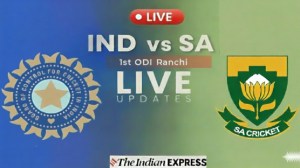The Second Mate
The hallucinogenic exhilaration of Amitav Ghoshs first Ibis book settles for history lite in the second.
River of Smoke
Amitav Ghosh
Hamish Hamilton
Pages: 558
Rs 699
Voyages have their own destinies and destinations. Amitav Ghoshs Sea of Poppies,the first book of the Ibis trilogy that came out three years ago,was fuelled by the smoke of the opium. As its haze spread across the banks of the Ganga and the carcannas of Ghazipur,men and women,fleeing their fates on land,were driven to the belly of a schooner sailing for Mauritius. There was a giddiness to it,a marvellous linguistic capriciousness even,as dialects tripped off the tongue of the ships vastly different travellers. It had the sea-tossed fever of a first voyage.
Dear reader,Book Two is nothing like the hallucinogenic Book One. But,then,that is a seafarers and often a sequels lot.
River of Smoke,the middle book of the proposed trilogy,begins on a new land,Mauritius. It begins,yet again,with the light-eyed Deeti,who draws the past on walls and sees apparitions about the future. In her Memory Temple,marked with charcoal,visions and remembrances,the tufaan-scattered travellers of the Ibis come together as images. From the shadow lines of a charcoal drawing by Neel,the qaidi who flees the Ibis with four others and lucks it out in Canton as the munshi of Bombays opium merchant Bahram Modi,Ghosh constructs a tale that stretches across the Indian Ocean,its sea routes and trading posts the fledgling township of Singapore,Malaca,Macau and the wilderness that was Hong Kong.
This is a century 19th that can be gazed at from the prow of a ship. It is a century,perhaps the last one,that belonged to the ocean. Wars are fought and cargoes float on the seas. It is on the seas that Parsi trader Bahram Modi makes his closest friendships and his biggest fortunes,the latter with the cakes and cannonballs of Malwa and Bengal opium that he ships to Canton. It is on a sea voyage,in a delightfully indulgent diversion in the narrative,that Bahram meets the Bonaparte in St Helena!
If the first book was about the cultivation of poppies and the making of opium,the second is about its transport from Hindusthan to Maha-Chin,a nation dozing on fumes and clandestinely selling silver in exchange for some black mud.
As the coracle of narrative reaches the coast of Canton,the anthropologist in Ghosh takes over from the novelist. He keenly reconstructs the history of opium trade and retraces the geography of an unusual place the Fanqui-town,the enclave of foreigners in the farthest extremity of Canton. It has strait codes: no foreign woman can set foot on the enclave and no foreigner can step across the gates to the city. It has embassies called factories or hongs and a pidgin language,a mishmash of Hindustani,English and more,for communication. In a way,Fanqui-town is like a ship at sea,with hundreds no,thousands of men living crammed together in a little sliver of a space. I do believe there is no place like it on earth,so small yet so varied where people from the far corners of the earth must live,elbow to elbow it is as if you had arrived at the threshold of the last and greatest of all the worlds caravanserais.
When stealthy Chinese dealers smuggle the forbidden drug from ships docked in distant islands,at Fanqui-town traders form quaint rituals of male-bonding and catchi sing-song girlies in boudoir-like flower-boats. It is a land where continents collide with delightful and disastrous consequences. A strange decoction called garam chai gets made,much to the disgust of the Chinese,and samsa,the Uighur version of samosa,is snacked. But this time,in the years 1838 and 1839,opium merchants are hit as the emperor comes down hard on smuggling. His incorruptible High Commissioner Lin Tse-hsu faces off with the merchants,mostly British and a few Indians. Characters from history British traders William Jardine and Lancelot Dent inhabit Ghoshs narrative. Their words are carefully sourced and faithfully reproduced. So you see with amazing clarity the eve of the First Opium War; and hear the fulminations and arguments that lead to it.
But you dont see the characters that so colourfully and cacophonically peopled the Ibis in Sea of Poppies. Only two from the schooner are overwhelmingly present Paulette,the orphaned botanist,and Neel the raja of Raskhali their stories forming a sailors knot. As Paulette searches for flowers in the crags of Hong Kong,and the brig Redruth heaves with its unusual cargo of flora pots and cans of plants for China in return for specimens,especially of camellias you see the other important but more innocent pursuit of East-West interaction.
Events change,but characters seldom do in River of Smoke. It is a stasis that reminds you of portraiture and this is very much the portrait of a land whose momentous events form the big narrative,subsuming the little people.
This is engrossing history for the most parts,essential even,but if you have known the almost-opiate exhilaration of the first book,this is dumbcowing.



- 01
- 02
- 03
- 04
- 05




























